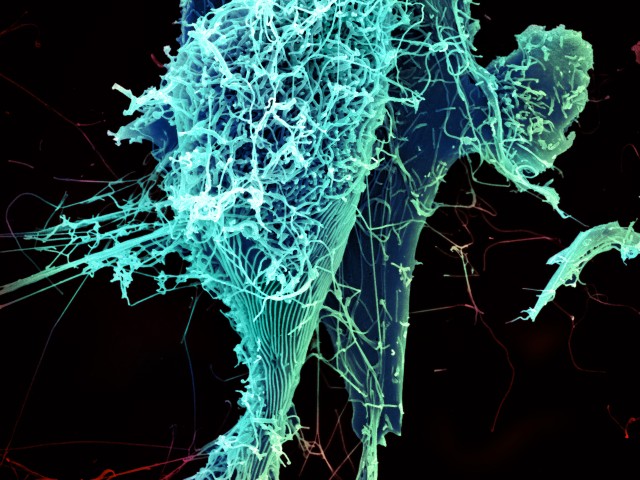What is Ebola?
Interview with
Ebola has been dominating the headlines for many months with governments and healthcare providers worldwide caught off-guard by the outbreak that's happening in West Africa.  Recently, according to the WHO, the death toll passed 5,000 people and the number of infections is still rising. Suzie English, a virologist from Addenbrooke's Hospital in Cambridge, explained to Chris Smith what Ebola is and how it causes disease...
Recently, according to the WHO, the death toll passed 5,000 people and the number of infections is still rising. Suzie English, a virologist from Addenbrooke's Hospital in Cambridge, explained to Chris Smith what Ebola is and how it causes disease...
Suzie - Ebola is a viral infection. It was discovered in 1976 after two very large outbreaks in central Africa in Zaire, now the Democratic Republic of Congo and the Sudan. In between human outbreaks, the virus is thought to hide out in fruit bats. At the beginning of outbreaks, it's thought to be transferred to humans through the consumption of or contact with bush-meat which may be the bats themselves or other animals that have been infected by bats.
Chris - What can you tell us about the present outbreak? Where did it come from and why has it been so dramatic?
Suzie - Well, the origins of the present very large outbreak in west Africa are not precisely known, but it is thought that there is an animal origin and that it has been transferred into humans through the consumption of bush-meat. The present outbreak began in a very rural area of Guinea, near the Liberia and Sierra Leone borders where there is a lot of cross border travel. And the viruses rapidly spread through those countries.
Chris - Do we know anything about how it got started in the first place?
Suzie - The index case has been traced back to a small child in December of 2013 in Guinea. Early work has looked at how the virus was transmitted firstly to people who cared for this child and then for people who cared for those people, and looked at in particular, the amplifying effects of hospitals and funerals in propagating the infection.
Chris - And talking of propagating the infection between individuals, how does it spread because there's been enormous controversy in the media about whether or not there's airborne spread or other mechanisms? How does it get about?
Suzie - So, Ebola is spread from person to person through direct contact with infected bodily fluids. A person who's infected with Ebola is particularly infectious during the later stages of their disease when they produce vast amounts of viruses in many bodily fluids. And also, people who have recently died from Ebola are also very infectious. Their bodies are very infectious. Funeral practices can propagate the infection when a large number of people come into contact with the recently deceased person's body.
Chris - Once a person has got it, a, how do we diagnose it? And, b, what can we do about the infection?
Suzie - So, when a person first becomes infected with Ebola, there's a period of silent multiplication of the virus within the body. This is called the incubation period. During the incubation period, the person is asymptomatic which means they don't have any symptoms, they don't have a fever, and they're not infectious. The first detectable manifestation of the infection is a fever which the person may or may not be aware of. And this is why people who've been exposed to Ebola have their temperature monitored. After the onset of the fever, the patient may develop flu-like symptoms - sore muscles, sore joints, headache, severe fatigue, and then after a few days may develop tummy pains, lack of appetite, nausea, vomiting and diarrhoea. Towards the end of the first week of their disease, the patient will develop dysfunction of many organs. So, they may develop kidney damage, liver damage, an inability to clot their blood and a severe immune response throughout their body which can damage their body further. For those who do not survive Ebola, this is the time when they develop multiple organ failure and shock. For those who survive Ebola, the disease typically lasts for approximately 2 weeks. But even after they recover from the virus, they can still be shedding the virus in their bodily fluids for some time and need to be retested to see if they have cleared the virus. In terms of treatments, the treatments fall into roughly three categories and all of them are under study. So, there's no definitive treatment for Ebola at present. The first category of treatment is supportive care. So, this is designed to support the body through the period of the disease until their body can fight off the infection. The second broad category of treatment are immunological therapies. These treatments involve giving antibodies from people who survived Ebola or synthetic antibodies to try and neutralise the virus and prevent it from infecting more cells in the body. The last category is anti-viral drugs which aim to prevent the virus from replicating in cells after they've infected the cells.
- Previous The fight against Ebola
- Next Switching off!










Comments
Add a comment